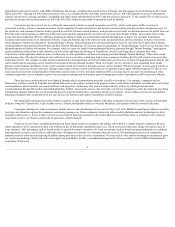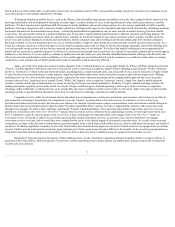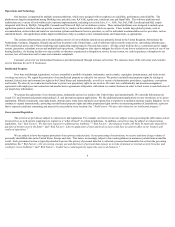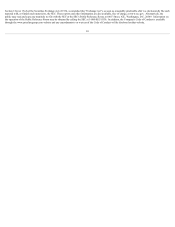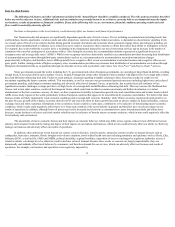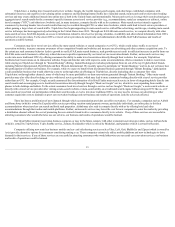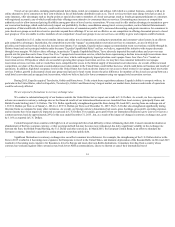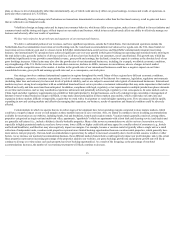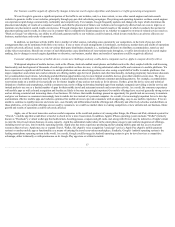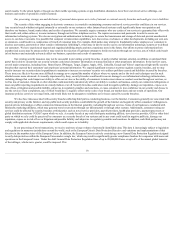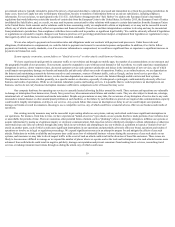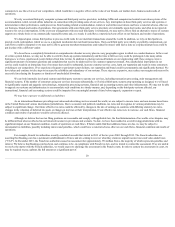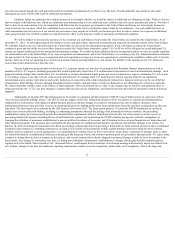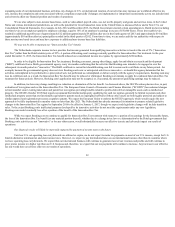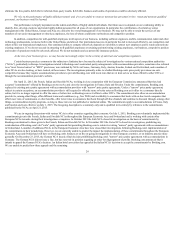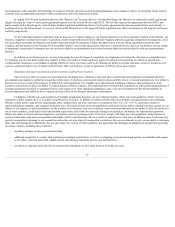Priceline 2015 Annual Report Download - page 19
Download and view the complete annual report
Please find page 19 of the 2015 Priceline annual report below. You can navigate through the pages in the report by either clicking on the pages listed below, or by using the keyword search tool below to find specific information within the annual report.
We believe that the increase in the number of accommodation providers that participate on our websites, and the corresponding access to accommodation
room nights, has been a key driver of the growth of our accommodation reservation business. The growth in our accommodation bookings typically makes us an
attractive source of consumer demand for our accommodation providers. However, accommodation providers may wish to limit the amount of business that flows
through a single distribution channel. As a result, we may experience constraints on the number of accommodation room nights available to us, which could
negatively impact our growth rate and results of operations.
The number of our employees worldwide has grown from less than 700 in the first quarter of 2007 to approximately 15,500 as of December 31, 2015 ,
which growth is mostly comprised of hires by our international operations. We may not be able to hire, train, retain, motivate and manage required personnel,
which may limit our growth, damage our reputation, negatively affect our financial performance, and otherwise harm our business. In addition, expansion increases
the complexity of our business and places additional strain on our management, operations, technical performance, financial resources and internal financial
control and reporting functions. Our current and planned personnel, systems, procedures and controls may not be adequate to support and effectively manage this
growth and our future operations, especially as we employ personnel in multiple geographic locations around the world.
We rely on online advertising channels to enhance our brand awareness and to generate a significant amount of traffic to our websites.
We believe that maintaining and expanding the Booking.com, priceline.com, KAYAK, agoda.com, rentalcars.com and OpenTable brands, along with our
other owned brands, are important aspects of our efforts to attract and retain customers. Effective online advertising has been an important factor in our growth,
and we believe it will continue to be important to our future success. As our competitors spend increasingly more on advertising, we are required to spend more in
order to maintain our brand recognition and, in the case of online advertising, to maintain and grow traffic to our websites. In addition, we have invested
considerable money and resources in the establishment and maintenance of our brands, and we will continue to invest resources in advertising, marketing and other
brand building efforts to preserve and enhance consumer awareness of our brands. We may not be able to successfully maintain or enhance consumer awareness
and acceptance of our brands, and, even if we are successful in our branding efforts, such efforts may not be cost-effective. If we are unable to maintain or enhance
consumer awareness and acceptance of our brands in a cost-effective manner, our business, market share and results of operations would be materially adversely
affected.
Our online advertising efficiency, expressed as online advertising expense as a percentage of gross profit, is impacted by a number of factors that are
subject to variability and that are, in some cases, outside of our control, including ADRs, costs per click, cancellation rates, foreign exchange rates, our ability to
convert paid traffic to booking customers and the extent to which consumers come directly to our websites or mobile apps for bookings. For example, competition
for desired rankings in search results and/or a decline in ad clicks by consumers could increase our costs-per-click and reduce our online advertising efficiency. We
use third-party websites, including online search engines (primarily Google), meta-search and travel research services, and affiliate marketing as primary means of
generating traffic to our websites. Our online advertising expense has increased significantly in recent years, a trend we expect to continue. In addition, from 2011
to 2013 our online advertising grew faster than our gross profit due to (1) year-over-year declines in online advertising returns on investment and (2) brand mix
within The Priceline Group as our international brands grew faster than our U.S. brands and spent a higher percentage of gross profit on online advertising. In
2014, these long-term trends continued, but were more than offset by the inclusion of KAYAK and OpenTable because they spend a lower percentage of gross
profit on online advertising than our other brands. Also, our consolidated results exclude intercompany advertising by our brands on KAYAK. In 2015, online
advertising efficiency declined compared to the prior year, mainly due to lower ROIs. Any reduction in our online advertising efficiency could have an adverse
effect on our business and results of operations, whether through reduced gross profit or gross profit growth or through advertising expenses increasing faster than
gross profit and thereby reducing margins and earnings growth.
We believe that a number of factors could cause consumers to increase their shopping behavior before making a travel purchase. Increased shopping
behavior reduces our online advertising efficiency and effectiveness because traffic becomes less likely to result in a purchase on our website, and such traffic is
more likely to be obtained through paid online advertising channels than through free direct channels. Further, consumers may favor travel services offered by
search companies or meta-search sites over OTCs, which could reduce traffic to our travel reservation websites, increase consumer awareness of our competitors'
brands and websites, increase our advertising and other customer acquisition costs and adversely affect our business, margins and results of operations. To the
extent any such increased shopping behavior leads to growth in our KAYAK meta-search business, such growth may not result in sufficient increases in revenues
from our KAYAK meta-search business to offset any related decrease in gross profit or increase in advertising and other customer acquisition costs experienced by
our OTC brands.
16


